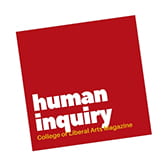 La mucama de Omicunlé is a novel by Rita Indiana, a Dominican writer and singer-songwriter whose writing features themes of queerness. Dr. Alexandra Gonzenbach Perkins, Assistant Professor of World Languages & Literatures, wrote an article interpreting the novel. Perkins’ article–“Queer Materiality, Contestatory Histories, and Disperse Bodies in La mucama de Omicunlé” published in the Journal of Latin American Cultural Studies–argues that the novel “challenges conventional articulations of…the body and its interaction with the natural environment.”
La mucama de Omicunlé is a novel by Rita Indiana, a Dominican writer and singer-songwriter whose writing features themes of queerness. Dr. Alexandra Gonzenbach Perkins, Assistant Professor of World Languages & Literatures, wrote an article interpreting the novel. Perkins’ article–“Queer Materiality, Contestatory Histories, and Disperse Bodies in La mucama de Omicunlé” published in the Journal of Latin American Cultural Studies–argues that the novel “challenges conventional articulations of…the body and its interaction with the natural environment.”
In the novel, Acilde, the main character, is a maid and protege of a political official, but also a sex worker. Acilde is androgynous, which is valuable in the sex work. Acilde begins saving money for injections to complete gender reassignment, and ultimately the main character inherits a fortune from a client, as well as the ability to travel through time and warn the world of the consequences of climate change and the destruction of humanity.
Perkins explains that the novel presents an alternative way of seeing how humans relate to nature. “The protagonists do not merely inhabit the environment; rather, the environment inhabits them and challenges their separation from the natural world.” Perkins argues that the plot and characterization portray “nature as a materially separate being from humankind.”
Perkins also shows how the novel references Dominican culture. She says the book relies on a “Caribbean cosmology” where the past, present, and future coexist, through a story about “doubling through space and time.”
According to Perkins, the book challenges traditional ideas about gender and time. It “both represents and creates a material reality that dismantles static and fixed readings of…time, space, and being.”
Ultimately, Perkins says that “queer materiality” is this alternative way of seeing how fluidly the body interacts with time and space. And, Perkins argues that queer materiality “allows humankind to reshape our place in the world” and revise “long-held narratives of human dominion over the natural environment.”
